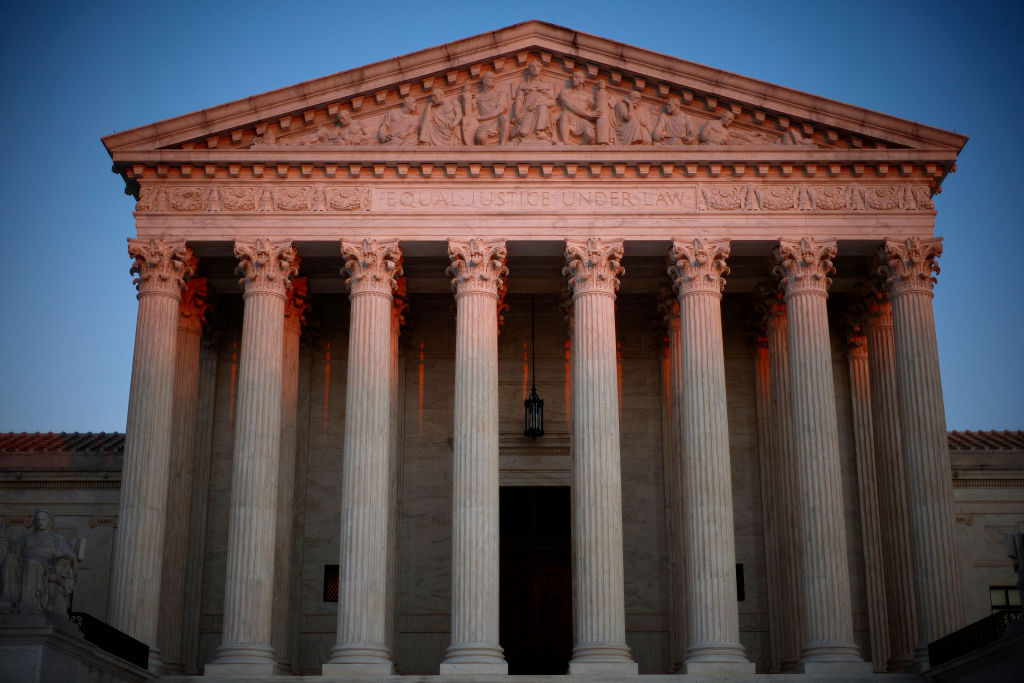
Source: Chip Somodevilla / Getty
President Joe Biden remains firm in his promise to nominate a Black woman to replace Justice Stephen Breyer on the U.S. Supreme Court. As expected, the fake outrage at the prospect of a Black woman justice is riddled with commentary undermining the qualifications and fitness of the future nominee.
The road to confirmation for a Black woman will not be easy. And the standard set for a Black woman will be higher than the low threshold crossed by many of her future colleagues.
Biden’s commitment stands apart from former President Georgia H.W. Bush’s nomination of a Black justice to replace the late Thurgood Marshall. In many ways, Biden’s nomination could finally provide the Court with a successor to Marshall’s legacy.
Judith Browne Dianis, executive director of the Advancement Project – National, told NewsOne that while the prospect of a Black woman on the bench is exciting, the nomination should consider the person’s background and ability to contextualize history and its impact on constitutional interpretations.
“There’s a Black person who sits on the Supreme Court, and when we say we want to Black person on the Supreme Court, we don’t need another repeat of that person,” Browne Dianis said. “It’s the opportunity to have a Black person who understands the history of the Constitution, but also understands how race and the law have been inextricably tied together since the founding of this country.”
While some liberals shared their dream picks by name-dropping the only three Black women attorneys they know, there are several Black women on the federal bench, leading national civil rights organizations and legal scholars who could be in consideration.
In a statement, Aimee Allison, the founder of She the People a national network of women of color working to transform democracy, said that Biden’s efforts to expand the diversity of the federal judiciary have set him up with a qualified list of potential nominees.
“President Biden doesn’t have to look far for the most qualified candidates for this seat,” Allison said. “Judge Kentanji Brown Jackson, Judge Leondra Kruger, and Judge Michelle Childs all have and continue to serve honorably on U.S federal circuit and state courts and would each make formidable nominations on their individual merits.”
She also stressed the importance of having another voice willing to challenge the ultra-conservative status quo on the Court.
“We’ve seen the importance of having Justice Sotomayor speak up as a woman of color and a dissenting voice against a conservative majority,” Allison said. “Not only will an appointment of a Black woman provide the much-needed perspective on the Supreme Court at a time when issues of women’s rights and voting rights are regrettably still being debated, but this decision could determine if core voters actually turn out in the midterms after critical policy and political losses.”
Such perspective comes as the Court will hear a new challenge to affirmative action in college admissions. Browne Dianis further explained the power of a strong dissent in guiding the nation’s discourse.
“We’ve been living in this constant state of not having a majority of justices who get it on civil rights,” Browne Dianis said. “A strong dissent is an important dissent. Justice Sotomayor writes important words and opinions that make us stop and think about the way that the Supreme Court is interpreting the Constitution.”
As a civil rights attorney and a student of legal history, Browne Dianis said that while Biden’s nomination might not shift the balance of power on the Court, it sets the stage for how the Supreme Court can change in the future. The Court’s future depends on the right person being nominated and confirmed.
The nomination of a Black woman will happen within the context of a national battle over the impact of racism in American laws and history. Across the country, state legislatures and school boards are taking steps to roll-back progress made in conversations about race and injustice.
Browne Dianis says that some Senators will go after a Black woman nominee for the exact reasons one is needed. She said that it is unquestionable that race has played a role in the way laws have been written and interpreted.
“What is important to me in a Supreme Court Justice are the exact same things that will be attacked by some of the senators,” Brown Dianis said. “And while some people don’t want to teach what the impact of the law has been in shaping racism in this country, we know that it exists,” Browne Dianis said.
Michele Watley, the founder of the Shirley’s Kitchen Cabinet a non-partisan non-profit amplifying the voices and power of Black women, reflected on the timing of the conversation about the prospect of a Black woman on the Supreme Court.
“It’s interesting that we’re having this conversation on the heels of the anniversary of Shirley Chisholm’s historic announcement of her run for president,” Watley said.
Fifty years ago this week, Chisholm announced her run for the Democratic nomination for president. During her campaign, Chisholm pushed not just to be the first Black woman to run for a major party nomination but to leverage her political capital for the advancement of the Black community.
Watley says a Black woman Supreme Court Justice could have a similar impact. But she cautions the Biden Administration not to treat nominating a Black woman as a tradeoff for other campaign promises that have not come to fruition.
“Hopefully, this doesn’t become an either/or versus a both/and situation,” Watley said. “We still need the administration to figure out how to follow through on the promises regarding voting rights and criminal justice reform.”
SEE ALSO:
5 Black Women To Consider For Next Supreme Court Justice
Senate Confirms Judge Ketanji Brown Jackson Amid Push For Justice Breyer To Step Down From SCOTUS
Biden’s Supreme Court Nomination ‘An Opportunity’ To Have A Black Justice Who Gets It On Civil Rights was originally published on newsone.com















